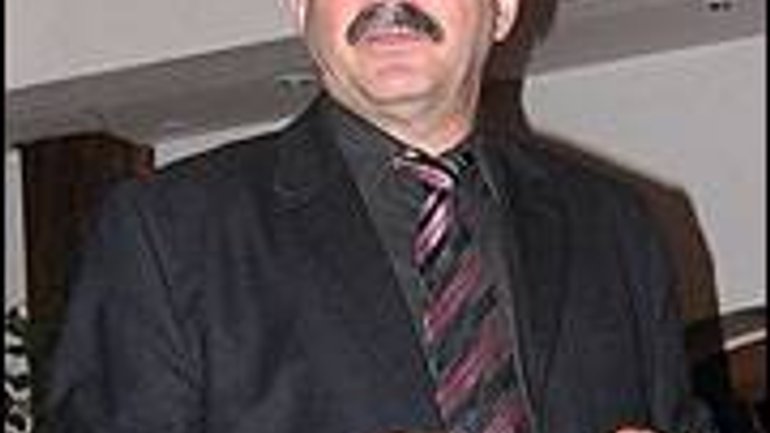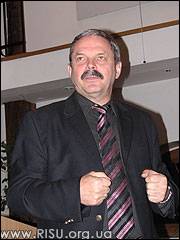"I want to believe that, during the last 15 years, people in Ukraine have become so convinced of the good of religious freedom that they will not be easily led astray."

 Interview with Myroslav MARYNOVYCH, director of the Institute of Religion and Society of the Ukrainian Catholic University and founding member of the Ukrainian Helsinki Group
Interview with Myroslav MARYNOVYCH, director of the Institute of Religion and Society of the Ukrainian Catholic University and founding member of the Ukrainian Helsinki Group
- To begin with, I would like to ask you a question on a general topic. Freedom has several, let us say, dimensions. One can talk of freedom using all-human, liberal notions. What is freedom’s dimension from the point of view of religion, faith, spirituality?
- Freedom of religious expression is often also called freedom of conscience. And there is a deep philosophy in that. Because the human conscience defines what place the person ascribes to himself in the universe, the way the person sees the universe, his place in it, people around, and so on. This understanding, this interpretation of the universe and one’s place in it, provides for a very powerful religious or quasi-religious component. Why “quasi”? I do not believe that a person can be completely irreligious, that this important component of the religious view of the world can be missing. It can be expressed in non-religious language, but a person holds a position on this issue. I remember being stopped by a judge during my trial when I intended to quote Lenin: “Stop this. The name of Lenin uttered by you sounds like a sacrilege.” This is a vivid illustration of the fact that the system, which openly declared itself to be antireligious, was quasi-religious in reality. Because that model, the attitude to sacredness, was the same as in religion. Therefore, the religious component is very powerful in the dimension of freedom.
For me, personally, this is a determining component, because I do not draw schemes after the Bolshevik pattern, “matter→spirit.” My schematic model is “spirit→matter→spirit.” Spirit is the source of material things, which later return to their creator, the spirit. Spiritual phenomena are primary, and, therefore, the spiritual freedom behind the notion of religious freedom is the determining matter for me. As all human rights actually originated from religious rights (these are not my words, but the words of the late Pope John Paul II), so freedom also begins first of all with the freedom of spirit, freedom of human conscience, then follow all the other dimensions of freedoms: national. group, professional freedoms, and so on.
- We are celebrating the 30th anniversary of the beginning of a, so to say, new branch of the rights protection movement, the Helsinki Movement. You were one of the founders of the Ukrainian Helsinki Group (UHG). What were your motives when you entered that group, was there any religious motive?
- At that moment, I was rather indifferent to religious problems. As the grandson of a priest, I respected the church and the priestly order in general. It was in me and could not disappear, yet at the same time, I was indifferent to the problems of the faith. I understood very clearly, though, that the church should be governed by religious freedom, should enjoy religious freedom, and that this applied not only to the church, but to every particular person. Therefore, the Ukrainian Helsinki Group stood in defense of the religious freedom of religious organizations of the time, not limited to the Greek Catholic or Autocephalous Orthodox Church, but also other religious communities. Therefore, we were later supported by the Baptists, for instance. They announced the beginning of prayer for the arrested members of the Helsinki Group. I think this was done exactly due to their understanding that the group defended the religious freedom of all religious communities of Ukraine.
- In what way and how often was the religious question raised in the UHG? Were any concrete actions taken? You mentioned the Baptists who prayed for all who were imprisoned for the protection of rights. Perhaps you remember other similar examples?
- I know that the problems of religious freedom were touched on in the first memorandum of the Ukrainian Helsinki Group, which was an overview. Problems of spiritual development were also touched on in memorandums about holy Ukraine, the spiritual republic, about what later developed into the notion of the “spiritual republic” of Oles Berdnyk. He was a member of our group and he carried the germs of the ideas already at the time of the Helsinki Group. This is what I remember.
- Were there any specific incidents when other members of the Helsinki Group were persecuted for their religious views?
-I would say that we were persecuted primarily for our membership in the group. And I think that the political component of indignation at the Soviet regime was stronger than any of our religious convictions. Religion seemed a very minor thing to our political leaders.
- At a recent meeting about the UHG held at the Ukrainian Catholic University, you said that even among members of the Ukrainian Helsinki Group there were different interpretations of religious freedom. What do you mean?
- We, in general, did not have a separate discussion on this subject because a more or less unambiguous understanding of what was to be declared, namely, religious freedom as a component of human rights, was accepted a priori. Of great importance to us was article 18 (if I am not mistaken) of the closing act “On the right of a person to unhindered religious beliefs.” Speaking about our differing understandings of the implementation of democratic principles at the seminar, I meant rather differences in our treatment of, let us say, problems of the political system, the character of power in the future.
It later turned out (not among the members of the Helsinki Group, but among the members of the Ukrainian resistance) that there were some people who sought religious freedom primarily for their own communities. And when it turned out that their religious communities were granted the right to existence and had to act in the competitive environment of religious communities viewed by them as designedly anti-Ukrainian, there emerged the question of why we allowed designedly anti-Ukrainian institutions to exist. From the point of view of such a concerned person, such organizations were to be legally prohibited. Here, we enter a whole field of discussions on the subject: Can the state alone determine which religious institution is right and which is not? It is clear that, according to Ukrainian law, any religious organization existing in the state should act within the limits of the legal field. There are no objections in this regard either from rights protectors or from concerned people, but the interpretation of danger is different for the state.
-This problem must have become especially urgent by the late 1980s, early 1990s. What was the position of rights protectors on this issue then? To what degree did they seek to influence the situation? Were there any incidents when they found themselves, let us say, on different sides of the front during the hostilities, for instance, between Greek Catholics and Orthodox?
- They really sometimes found themselves on different sides of the front. For instance, I was a Greek Catholic and Oksana Yakivna Meshko was an activist for the revival of the Autocephalous Orthodox Church. It seemed that some misunderstandings should have been provoked by that. But they were not. We respected each other, anyway. There were no conflicts between us. Or I can put it in a different way. Situations did occur (I was not alone, I am simply not going to mention who held the same position), but I held the following position: at one time, my answer to the question if I am Greek Catholic or Orthodox was that I am a Christian. It was not my invention. I read in some underground literature that at times of conflicts between organizations, rights protectors and people of spiritual disposition in general declared their neutral position if they did not want to accept the hatred model. In this particular case, “Christian” was quite an accurate definition.
As for right protectors in general, many of them made attempts to reconcile opponents directly, to influence the process of mutual adjustment between religious communities. For instance, Yevhen Sverstiuk, an Orthodox, is not a “rights protector” proper. He was a member of the ‘60s group, a member of the resistance movement, and does not declare himself to be a rights protector. Nevertheless, he visited Halychyna [far western Ukraine]. For instance, together we visited Sambir, where there were conflicts between Orthodox and Greek Catholics, and both of us appealed to various communities quite unanimously as we called them to peace. It was not very successful, but, in principle, such attempts were made. At one time, I repeatedly called religious communities to reconcile and settle things at the table of negotiations in my articles in the Drohobych newspaper “Halychyna Star.”
-The situation regarding freedom must have changed for the better over the last fifteen years. However, the rights protection movement is still quite active in Ukraine, the Helsinki movement is continued by the Ukrainian Helsinki Association of Human Rights Protection, which also raises the question of religious freedom. What are the biggest problems for religious freedom in Ukraine now, in your opinion?
- Today, the level of religious freedom in Ukraine is quite high, and there was no substantial deterioration even at the worst time of [former president Leonid] Kuchma’s administration. However, this situation is not fixed tightly: I was greatly troubled to hear that the government has recently revived the State Committee on Religious Matters.
In addition, it was reported that the Party of Regions prepared and is going to introduce in Parliament a bill on religious organizations which is to introduce new laws in the legislative field of Ukraine, which laws will actually duplicate similar Russian laws envisaging preferences for one denomination. I think this is a dangerous syndrome, the attempt of one church to use the political situation in order to secure more rights for itself. This is a syndrome of a return to past practices. Therefore, I consider it very dangerous.
I want to believe that Parliament, even in its present composition, will not have the majority to pass this, and if it happens that all the parties of the “anti-crisis coalition” do decide to meet their partnership obligations to the detriment of Ukraine, I do not believe that this law will last for long. I want to believe that, during the last 15 years, people in Ukraine have become so convinced of the good of religious freedom that they will not be easily led astray.
Interview conducted by Taras ANTOSHEVSKYY, Lviv, 16 November 2006.









